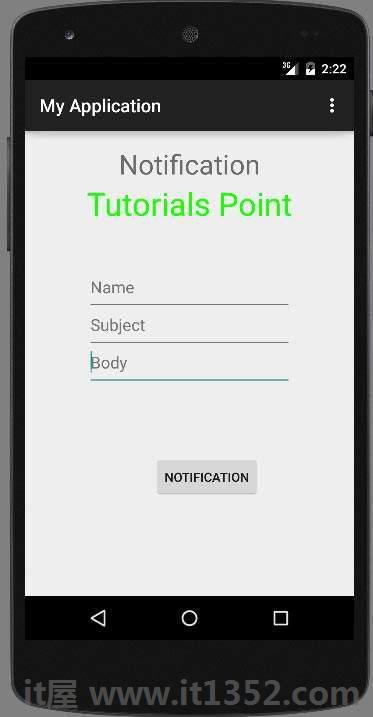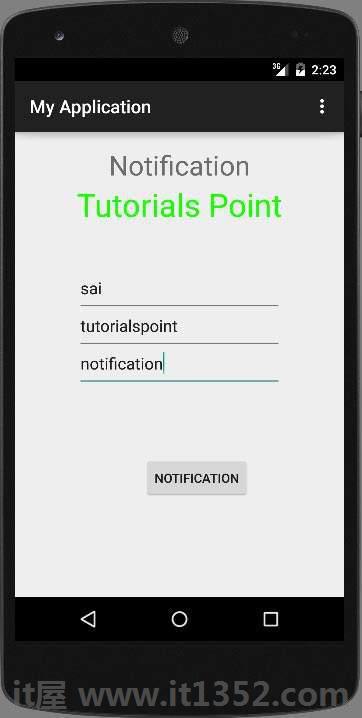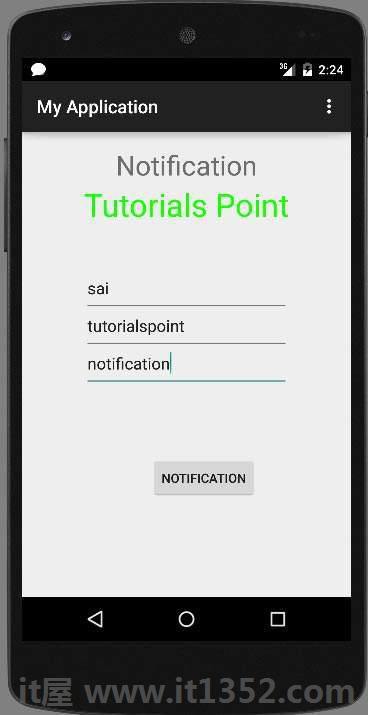通知是您可以在应用程序的普通用户界面之外向用户显示的消息.您可以非常轻松地在Android中创建自己的通知.
为此,Android提供了 NotificationManager 类.为了使用这个类,你需要通过 getSystemService()方法请求android系统来实例化这个类的对象.它的语法在下面和下面给出;
NotificationManager NM; NM=(NotificationManager)getSystemService(Context.NOTIFICATION_SERVICE);
之后,您将通过通知类创建通知,并指定其属性,如图标,标题和时间e.t.c.它的语法在下面和下面给出;
Notification notify = new Notification(android.R.drawable.stat_notify_more,title,System.currentTimeMillis());
您需要做的下一件事是通过将context和intent作为参数传递来创建 PendingIntent .通过向另一个应用程序提供PendingIntent,您授予它执行您指定的操作的权利,就好像另一个应用程序是您自己一样.
PendingIntent pending = PendingIntent.getActivity(getApplicationContext(), 0, new Intent(),0);
您需要做的最后一件事是调用Notification类的 setLatestEventInfo 方法并传递挂起的意图以及通知主题和身体细节.其语法如下.然后最后调用NotificationManager类的notify方法.
notify.setLatestEventInfo(getApplicationContext(), subject, body,pending); NM.notify(0, notify);
除了notify方法之外,NotificationManager类还有其他方法可用.它们列在下面和下面;
| Sr.No | 方法&描述 |
|---|---|
| 1 | 取消(int id) 此方法取消之前显示的通知. |
| 2 | 取消(String tag,int id) 此方法也取消之前显示的通知. |
| 3 | cancelAll() 此方法取消之前显示的所有通知. |
| 4 | notify(int id, Notification notification) 此方法发布通知以显示在状态栏中. |
| 5 | notify(String tag,int id,Notification notification) 此方法还发布通知以显示在状态栏中. |
以下示例演示了NotificationManager类的用法.它包含一个允许您创建通知的基本应用程序.
要试验此示例,您需要在实际设备或模拟器中运行它.
| 步骤 | 描述 |
|---|---|
| 1 | 您将使用Android studio在a下创建Android应用程序packagecom.example.sairamkrishna.myapplication. |
| 2 | 修改src/MainActivity .java文件添加通知代码. |
| 3 | 修改布局XML文件res/layout/activity_main.xml如果需要,添加任何GUI组件. |
| 4 | 运行应用程序并选择一个正在运行的Android设备并在其上安装应用程序并验证结果. |
这里是 MainActivity.java 的内容.
在f中下面的代码 abc 表示it1352的标识.com
package com.example.sairamkrishna.myapplication;
import android.app.Notification;
import android.app.NotificationManager;
import android.content.Context;
import android.support.v7.app.ActionBarActivity;
import android.os.Bundle;
import android.view.View;
import android.widget.Button;
import android.widget.EditText;
public class MainActivity extends ActionBarActivity {
EditText ed1,ed2,ed3;
protected void onCreate(Bundle savedInstanceState) {
super.onCreate(savedInstanceState);
setContentView(R.layout.activity_main);
ed1=(EditText)findViewById(R.id.editText);
ed2=(EditText)findViewById(R.id.editText2);
ed3=(EditText)findViewById(R.id.editText3);
Button b1=(Button)findViewById(R.id.button);
b1.setOnClickListener(new View.OnClickListener() {
@Override
public void onClick(View v) {
String tittle=ed1.getText().toString().trim();
String subject=ed2.getText().toString().trim();
String body=ed3.getText().toString().trim();
NotificationManager notif=(NotificationManager)getSystemService(Context.NOTIFICATION_SERVICE);
Notification notify=new Notification.Builder
(getApplicationContext()).setContentTitle(tittle).setContentText(body).
setContentTitle(subject).setSmallIcon(R.drawable.abc).build();
notify.flags |= Notification.FLAG_AUTO_CANCEL;
notif.notify(0, notify);
}
});
}
}以下是 activity_main.xml 的内容
<?xml version="1.0" encoding="utf-8"?> <RelativeLayout xmlns:android="http://schemas.android.com/apk/res/android" xmlns:tools="http://schemas.android.com/tools" android:layout_width="match_parent" android:layout_height="match_parent" android:paddingLeft="@dimen/activity_horizontal_margin" android:paddingRight="@dimen/activity_horizontal_margin" android:paddingTop="@dimen/activity_vertical_margin" android:paddingBottom="@dimen/activity_vertical_margin" tools:context=".MainActivity"> <TextView android:layout_width="wrap_content" android:layout_height="wrap_content" android:text="Notification" android:id="@+id/textView" android:layout_alignParentTop="true" android:layout_centerHorizontal="true" android:textSize="30dp" /> . <TextView android:layout_width="wrap_content" android:layout_height="wrap_content" android:text="Tutorials Point" android:id="@+id/textView2" android:layout_below="@+id/textView" android:layout_centerHorizontal="true" android:textSize="35dp" android:textColor="#ff16ff01" /> <EditText android:layout_width="wrap_content" android:layout_height="wrap_content" android:id="@+id/editText" android:layout_below="@+id/textView2" android:layout_alignLeft="@+id/textView2" android:layout_alignStart="@+id/textView2" android:layout_marginTop="52dp" android:layout_alignRight="@+id/textView2" android:layout_alignEnd="@+id/textView2" android:hint="Name" /> <EditText android:layout_width="wrap_content" android:layout_height="wrap_content" android:id="@+id/editText2" android:hint="Subject" android:layout_below="@+id/editText" android:layout_alignLeft="@+id/editText" android:layout_alignStart="@+id/editText" android:layout_alignRight="@+id/editText" android:layout_alignEnd="@+id/editText" /> <EditText android:layout_width="wrap_content" android:layout_height="wrap_content" android:inputType="textPersonName" android:ems="10" android:id="@+id/editText3" android:hint="Body" android:layout_below="@+id/editText2" android:layout_alignLeft="@+id/editText2" android:layout_alignStart="@+id/editText2" android:layout_alignRight="@+id/editText2" android:layout_alignEnd="@+id/editText2" /> <Button android:layout_width="wrap_content" android:layout_height="wrap_content" android:text="Notification" android:id="@+id/button" android:layout_marginTop="77dp" android:layout_below="@+id/editText3" android:layout_alignRight="@+id/textView" android:layout_alignEnd="@+id/textView" /> </RelativeLayout>
以下是 AndroidManifest.xml 的内容.
<?xml version="1.0" encoding="utf-8"?> <manifest xmlns:android="http://schemas.android.com/apk/res/android" package="com.example.sairamkrishna.myapplication" > <application android:allowBackup="true" android:icon="@mipmap/ic_launcher" android:label="@string/app_name" android:theme="@style/AppTheme" > <activity android:name=".MainActivity" android:label="@string/app_name" > <intent-filter> <action android:name="android.intent.action.MAIN" /> <category android:name="android.intent.category.LAUNCHER" /> </intent-filter> </activity> </application> </manifest>
让我们尝试运行我们的应用程序.要从Android工作室运行应用程序,请打开项目的一个活动文件,然后单击运行 icon从工具栏.在开始申请之前,Android studio将显示以下窗口,以选择您要运行Android应用程序的选项.
icon从工具栏.在开始申请之前,Android studio将显示以下窗口,以选择您要运行Android应用程序的选项.

现在用标题,主题和正文填写该字段.这已在下图中显示 :

现在点击通知按钮,您将在顶部通知栏中看到通知.它已经显示在下面 :

现在向下滚动通知栏并查看通知.这已经在下图中显示了 :
